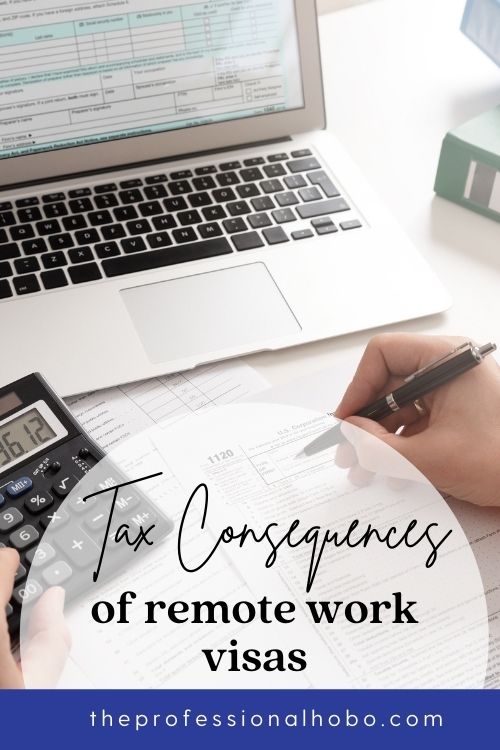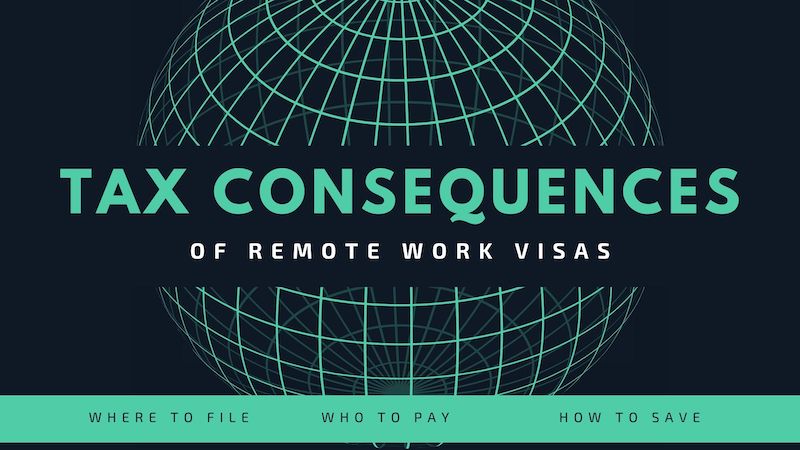With the growing number of corporations working remotely as well as an increase in demand for digital work, it’s no surprise that over the last few years, the significance of operating in an office has been slowly brushed out of the way.
Without the requirement of reporting to a physical workplace, plenty of workers are considering their ideal location to work from. For many freelancers, remote workers, and independent contractors, their location isn’t even within the same country as their employer.
What are the rules around working remotely? This guide will help you out with your questions regarding taxes whether that be you have a visa for remote workers, freelance visas, temporary resident visas, as well as tourist visas.
Olivier Wagner is the founder of 1040 Abroad, and he’s been helping expats and digital nomads with their U.S. tax needs since 2012. He prepares U.S. tax returns for expats and nomads who need regular annual tax filing, people getting into compliance after years/decades of not filing, and even people planning to renounce their citizenship. He also prepares Canadian tax returns!
I asked him to help answer the questions top of mind for remote workers who want to live abroad and take advantage of remote work visas. Below are his words of wisdom.
You Might Also Like:
- How to Manage Your Money: A Guide to Financial Planning for Long-Term Travelers
- 4 Financial Mistakes Most U.S. Expats Make
- Expat Health Insurance: Travel Insurance for Long-Term Travelers

The following is written by Olivier Wagner of 1040Abroad.com.
Remote Work During COVID-19
As the COVID-19 crisis hit, a few interesting things happened, namely:
- Countries that relied on tourism saw that source of income vanish almost completely overnight. And many of these countries no longer want people coming in and out, staying 2 weeks or less, potentially spreading the virus to the local population.
- As companies took measures to counter the spread of the virus in the workplace, the ability to work remotely became not only widely accepted but downright necessary.
As a result, countries are wisening up to make up for the lost tourism income. They’re capitalizing on remote work trends to attract a longer-term population of foreigners who would earn money from overseas and spend it in the local economy. By staying put, they would also mitigate the risk of spreading the virus.
And some employees also wised up: “If I can work from home, would it make a difference if my home was next to the beach on some tropical island?”
Tips for Working in Another Country:
- If you’re thinking about working abroad, it’s an excellent idea to get some guidance from an expert to make sure that you’re following the local laws of authority you’re about to travel to.
- There is no ubiquitous visa rule for every country in the world. A few countries may allow you to work on a tourist visa only if the extent of your work is restricted to your country of residence. While others might require a more grating approach especially if you’re on a long-term visa. Places like Antigua and Barbuda have a nomad residence permit for those who want to work remotely elsewhere.
- No matter where you are in the world, paying tax is a requirement. Your responsibility depends on your citizenship, which country you’re a resident in, and where you are staying/working.
- If you have a record of residence in two countries at the same time, you might get double taxed. To avoid this, it’s best to consult with an expert. (Check out what Kathleen from Wanderer’s Wealth can offer).
QUICK-FIRE Q&A: REMOTE WORK VISAS AND TAXES
Here are a few potential questions you may have about remote work and the quick answers. Further down you’ll get the full scoop.
If I’m working remotely from Bermuda for a year, where do I file my taxes? Bermuda? Or my home country (U.S.)? Or both?
First, assuming the case of a US citizen who is working in Bermuda: U.S. citizens would have to file a U.S. tax return. Bermuda stated that they will not tax those who work for a foreign (non-Bermuda) employer under the digital nomad visa. As such, they would not have to file a tax return with Bermuda.
Is the answer to the above question different depending on the country I’m living in that year? (eg: Estonia vs Bermuda)
Let’s look at a few countries:
Estonia and Iceland do not address that question in their digital nomad visa FAQs. Instead, if we turn to the US-Estonia and US-Iceland tax treaty, we find that one doesn’t have to pay tax income tax there if:
– He or she is present in Estonia / Iceland for less than 183 days in the year
– He or she is an employee of a US company (which doesn’t have a presence in Estonia / Iceland)The same would apply if he/she was from Canada as the Canada-Estonia and Canada-Iceland tax treaties have the same provision.
Dubai, part of the UAE does have income tax system for individuals, so no need to file a tax return there.
For other countries, check the FAQ of their official website describing the digital nomad visa, the international taxation page on Wikipedia, or contact me at [email protected]
What’s involved with filing my taxes abroad? Can I get my U.S. accountant to do it all?
Few accountants would be proficient in two or more tax systems. If you are required to file a local tax return in the country you are visiting, you most likely would hire a local tax preparer to file the local non-resident tax return, reporting only the employment income earned while in that country and then hand it over to your U.S. accountant who might use it to claim a foreign tax credit.
To be honest, I expected many such digital nomads to only file in the U.S., as a practical matter. I am pleasantly surprised to see that most of these countries legitimately do not require you to file a tax return.
If I qualify for Foreign Earned Income Exclusion (FEIE) because I’m living abroad that year, and I work remotely for a U.S. company, does that mean I don’t pay tax at all (up to $106k)? Or will I still have to file and pay tax in Bermuda (for example)?
That’s correct, if you can exclude all of your earning using the FEIE (more on that in a minute), you wouldn’t have any U.S. income tax owing.This will not impact your local income tax obligation. So you would still owe tax to the local country if applicable, but as we’ve seen it’s not usually required to file taxes abroad.
DETAILED TAX REQUIREMENTS FOR REMOTE WORKERS LIVING ABROAD
This information is specifically for people who had a brick-and-mortar job that has been converted to a remote job. It may also be useful to those who were already digital nomads, but probably to a lesser extent since you probably already did some tax planning. I’ll further restrict it to those from Canada and the United States (although residency-based taxation countries tend to operate in a similar way as Canada).
Income tax
As mentioned above, you would still report your worldwide income on your U.S. income tax return (Form 1040) for as long as you remain a US citizen (feel free to contact me if you want to change that and have some questions).
The fact that the U.S. operates on a citizenship-based taxation regime is often criticized, and rightly so. But fortunately it also has the Foreign Earned Income Exclusion which in some way makes it more attractive than other countries.
Foreign Tax Credit
If you paid income tax to the destination country on your employment income (which was anything you earned while physically present in that country, regardless of who your employer is – for example if your employer is a US corporation and you are paid into a US based bank account), you will be entitled to claim a foreign tax credit on form 1116. It will give you a dollar-for-dollar credit for taxes paid to that country, and therefore it would completely offset your US income tax liability if the tax rate in the destination country was higher than the one in the US.
Foreign Earned Income Exclusion (FEIE)
I will however assume that you didn’t pay foreign income tax, or if you did it was at a rate significantly lower that the US tax rate. As such, you would have to rely on the Foreign Earned Income Exclusion instead. The Foreign Earned Income Exclusion allows you to exclude your foreign earned income, meaning either wages or self-employment income that were earned when you were physically present in a foreign county.
For tax year 2020, the maximum exclusion is $107,600 per person.In order to qualify, you would need to meet either the Bona Fide Residence Test or the Physical Presence Test:
Bona Fide Residence Test
This test requires you to be an actual resident of a foreign country; it would be achieved by having many ties with that country. In addition, it is a legal requirement to have been a resident of that country for a full calendar year.
As such, someone who left the U.S. in 2020 would not be able to claim the Bona Fide Residence Test since he/she was not a resident of that country on January 1, 2020.In addition, having a remote work visa valid for a single year is probably not sufficient to claim that test regardless. It would require a more permanent immigration status.
Physical Presence Test
This is probably the one you will rely on to completely avoid paying U.S. income tax on the income earned in the destination country. It requires you to have spent at least 330 days in a foreign country or countries within any 12 month period (leaving you 35 days to spend in the U.S. or over international water).
The important word here is “any” 12 month period; as such, May 18, 2020, to May 17, 2021, would be one such period – although that would mean:
- That you would have to file your 2020 tax return after May 17, 2021, and
- The maximum amount that can be excluded would be prorated. So instead of being $107,600, it would be 107,600/366 x {the number of days of that 12 month period which fell in 2020).
You can find info on the Foreign Tax Credit vs. the Foreign Earned Income Exclusion here.
Social security
If you work for a U.S. corporation, generally speaking you will still be liable to pay social security even if you work outside the U.S. – your employer would simply continue to withhold your social security from your paycheck/W-2.If you work for a foreign (non-US) corporation, you would no longer be liable for social security taxes when working outside the U.S..If you are self-employed, you will be liable for social security tax; it will be called self-employment tax in this case. The filing is easier (attach schedule SE to your tax return), but the rate is the same 15.3% of net income.
You might be able to avoid paying it if your destination country has a social security totalization agreement with the U.S., but that would also mean that you would now be paying social security tax to that country instead.
Filing Tax for Remote Work Visas
To put it straightforwardly, your income taxes should be processed in the country or state that you’re working or residing in, even if your clients or employer live in a different state or country.
This applies to both a regular W-2 employee and an independent contractor (freelancer). This pertains to everyone including remote workers and digital nomads.
As I’ve mentioned above, some places require you to file for double taxes. Simply, if you live in your resident state but you have your non-residence state listed in your W-2 form, you are required to file two tax returns. This doesn’t necessarily mean that the tax you’re paying will be doubled. In some cases, the resident state usually issues a tax credit for the taxes paid to the non-resident place to avoid this.
Tax rates for contractors also change from country to country, it’s best to consult local guidelines for the particular tax rates and saving tips.
Tax for Canadian Citizens Abroad
Canadian citizens and residents have a different tax situation to the United States.
Income Tax
Similar to United States citizens, you would still report your worldwide income on your income tax return as long as you’re a Canadian resident.
Canada does allow you to claim a Foreign Tax Credit for taxes paid to a foreign country. It will give you a dollar-for-dollar credit for taxes paid to that country, and therefore it would completely offset your Canadian income tax liability if the tax rate in the destination country was higher than the one in Canada. Sadly, with the Canadian tax rate as high as it is, you may still have some actual tax owing.
What about becoming a non-resident of Canada?
In most cases, you would need to cut your ties with Canada and establish strong ties with the destination country. It most likely wouldn’t be the case if living there for a year on a remote work visa although you could have a stronger case if staying multiple years. Generally, these digital nomad visas wouldn’t allow you to become a non-resident of Canada.
If you are a tax resident of the other country and that other country has a tax treaty with Canada and you have a “permanent home available to you” in that country and not in Canada (feel free to contact me to discuss it further), you would have a somewhat better chance of being a non-resident of Canada by using the tax treaty (and therefore stop being taxed on your income sourced outside Canada).
Nora’s Note: I looked into becoming a non-resident of Canada when I traveled full-time and it felt pretty extreme (requiring me to close all bank accounts and stay out of the country for certain amounts of time). So for lack of staying anywhere else long enough to become an official resident of that country, I remained a “factual resident” of Canada for all the years I lived and worked abroad. That meant I filed one tax return – to Canada – and I claimed my total worldwide income each year. I was very grateful for having arranged my finances this way when I eventually returned to Canada to set up a home base.
Canada Pension Plan (CPP)
Generally, employment has to take place in Canada to be taxed under the Canada Pension Plan or the Employment Insurance Act. However, in certain situations employment outside Canada may be taxed as well. This is the case if a person is working outside Canada for a Canadian company or the Canadian government.
In addition, if you are an employee working outside Canada, voluntary CPP contributions can be made if Canada has a Social Security totalization agreement with the other country.
How Remote Workers Can Save and Pay Less in Taxes
Aside from things like medical insurance and budgeting for the country you’re residing in, paying taxes can be quite draining. But if you have everything in order, you can budget for it and it won’t take you by surprise. . With that being said, here are some tips to keep in mind:
- Look up the local constitutions about what differentiates employees from contractors and know what your status is. Always double check and don’t make assumptions..
- Before you travel or move somewhere outside the U.S., it’s best to learn about all the different laws and requirements regarding income taxes.
If you don’t speak “accountant”, some of the jargon in this article might have been tricky. I started 1040 Abroad in 2012, as a US citizen who moved to Canada. I have since been a Canadian resident, a Canadian non-resident, and a resident again. So I know the ropes, and I welcome your questions.
For more information, please contact my team here. – Oliver Wagner



